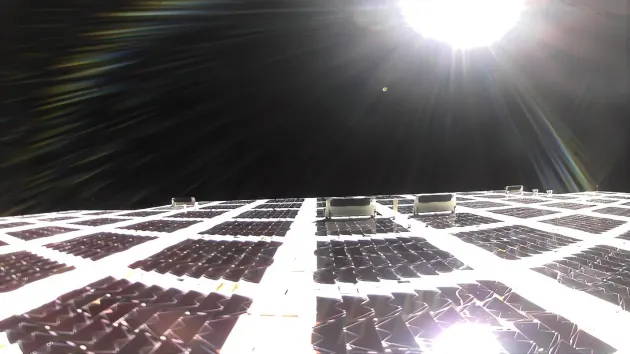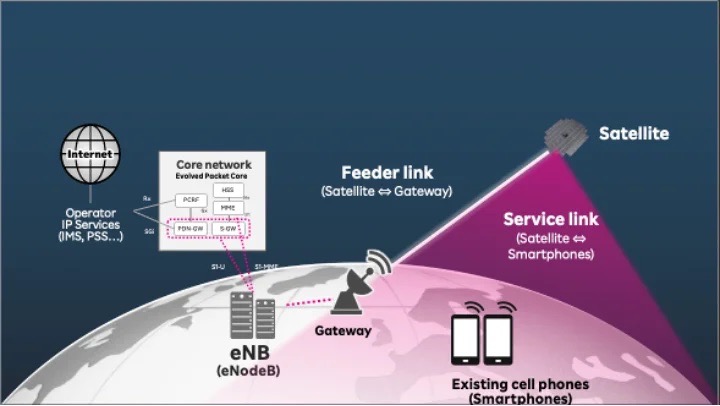Direct-to-satellite service tests are planned for the remote mountains on Japan’s northernmost island
Rakuten Mobile announced this week that it has obtained preliminary licenses from Japanese regulators to begin testing direct-to-mobile satellite communication. The company said it is working with satellite maker AST SpaceMobile and its recently launched BlueWalker 3 satellite to provide customers with ubiquitous connectivity even where there isn’t terrestrial cell coverage.
AST SpaceMobile has differentiated its planned service from other burgeoning direct-to-satellite mobile broadband services by claiming to be building the first and only space-based cellular broadband network accessible by off-the-shelf unmodified mobile phones. AST SpaceMobile launched its BlueWalker 3 satellite in September on board a SpaceX Falcon 9 rocket. The company announced earlier this week that BlueWalker 3 had been successfully deployed.

The BlueWalker 3 satellite has a 693-square-foot antenna, which is the largest array that has ever been deployed in low Earth orbit, according to AST SpaceMobile. The BlueWalker 3 is AST’s second test satellite, providing a glimpse into the future AST SpaceMobile has planned: A constellation of 168 similar satellites called BlueBirds, which the company is hoping to ultimately launch to create a global network of Low Earth Orbit (LEO) satellites. AST says it can build up to six of these satellites a month at its Texas manufacturing facility, and that global coverage should be reached once about 110 are in orbit.
Rakuten and AST SpaceMobile first announced they were working together more than a year ago. At the time, the companies hoped to begin commercial service in Japan by late 2023 or early 2024. Rakuten Mobile explained that to test communication with BlueWalker 3, the company had to apply to the Japanese government’s regional Tohoku Bureau of Telecommunications. The company sought a “Gateway Experimental Test Station” license, which it described in a press release as equivalent to a mobile base station. Rakuten Mobile also went to the Kanto Bureau of Telecommunications for a Mobile Terminal Experimental Test Station license, which it described as similar to a portable mobile base station. Both regulatory bodies approved the request, Rakuten Mobile noted.
With the bureaucratic paperwork out of the way, Rakuten Mobile said it’ll prep a gateway earth station, the equivalent of a mobile base station. That device will begin operating in Japan’s Fukushima prefecture, to help Rakuten test and verify direct communications between BlueWalker 3 and mobile handsets working in mountainous areas on the northern Japanese island of Hokkaido. Rakuten also described some of the essential software that AST SpaceMobile will be incorporating into its network to support the effort.

“To enable testing with Rakuten Mobile and other carriers, Rakuten Symphony will provide a variety of software from its Symworld product portfolio to AST SpaceMobile to be integrated into the company’s satellite system and enable the company’s space-based cellular broadband network. The software to be integrated includes Rakuten Symphony’s vRAN (virtualized Radio Access Network) software, OSS (Operations Support Systems) and BSS (Business Support Systems) software,” said Rakuten Mobile.
While AST SpaceMobile tests BlueWalker 3 with Rakuten Mobile and other telcos, other non-terrestrial networking (NTN) mobile efforts continue apace. Perhaps the highest-profile yet is Apple’s deployment of “Emergency SOS by satellite” on the iPhone 14 and iPhone 14 Pro, which launched earlier this week in the US and Canada, with plans to activate in some European countries in December. Apple developed the service with satellite operator Globalstar, contributing nearly half a billion dollars from its Advanced Manufacturing Fund to upgrade Globalstar’s ground stations with custom-designed high-power antennas. Unlike AST SpaceMobile’s proposed network, however, that service is limited only to iPhone 14 models, which have a Qualcomm modem that supports Globalstar’s n53 band.

